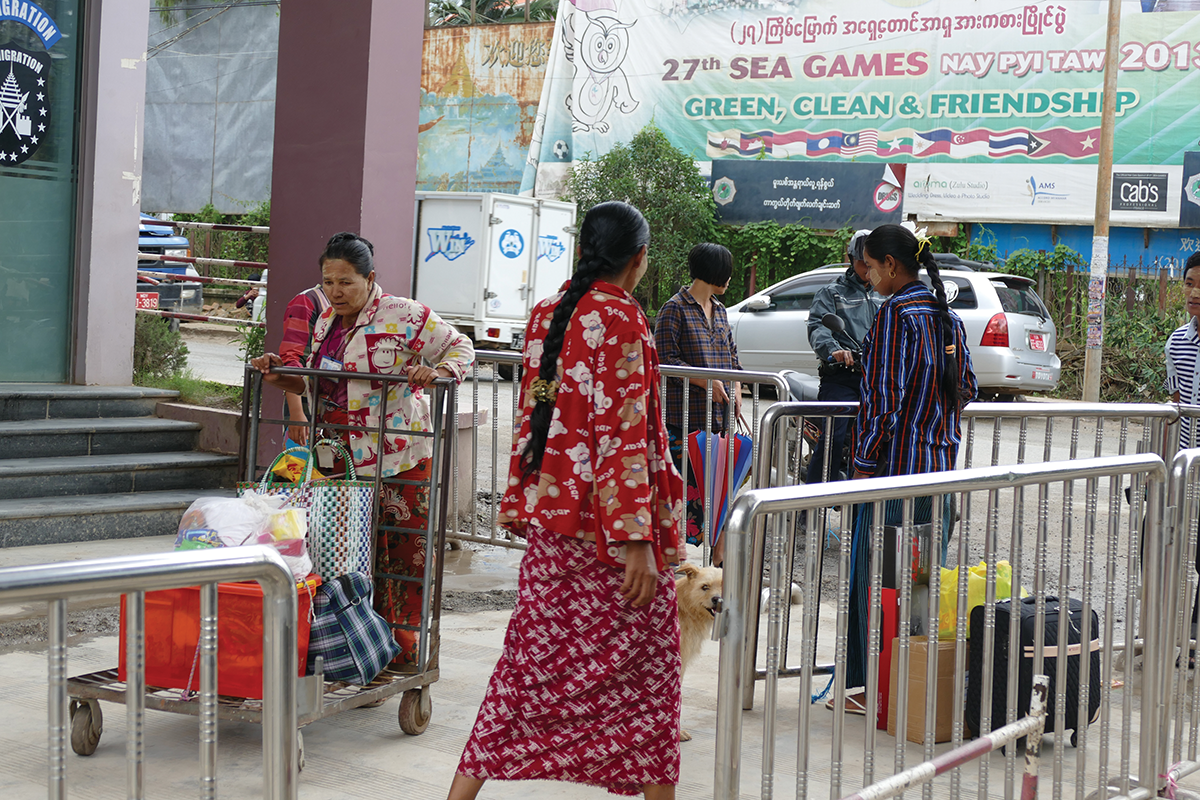
by Xiaobo Su, Associate Professor, Department of Geography
In demographic configuration, China’s most internationalized city is not Shanghai or Beijing, but Ruili, a small city located on the border between the Chinese province of Yunnan and northern Myanmar. In comparison with 200,000 Chinese permanent residents, about 42,000 Burmese workers live in Ruili, most of whom come through Muse, a Burmese city that shares a border with Ruili. Based on my recent fieldwork, despite limited official data, I estimate that almost half of these Burmese workers are female. This essay examines Burmese female workers’ daily experience in Chinese border cities.
Since 2008, labor costs in China have risen so that many factories have moved to either Southeast Asia or Africa, or to border areas with a secure supply of low-wage foreign labor. Meanwhile, local Chinese citizens in Ruili migrate to Kunming, the capital city of Yunnan province, for better employment, leaving jobs to be filled. To Burmese citizens living in Shan state, the largest ethnic administrative region in northern Myanmar, Chinese border cities are well developed and highly attractive. These cities generate various jobs and business opportunities. One Chinese Burmese whom I interviewed says that “salaries in Lashio are too low to support my family. That is why I come to Ruili to work as a chef in a local household.” Lashio is the largest city in Shan state and as this respondent and others introduced, salary in Ruili is much higher than Lashio and other cities in Shan state. Another respondent observes that the monthly salary in her hometown is about 200-300 Chinese yuan, while in Ruili she can earn at least 1500 Chinese yuan per month, doing a similar job. A 17-year-old girl who is ethnic Ta’ang, relates how she joined her two brothers to escape the conflicts between the Ta’ang Liberation Army and the Burmese Army. Having graduated from a local primary school, she works now as a nanny in a local Dai household in Ruili. She says that she has to learn how to use a washing machine, stove, air conditioner, and other household electronics, and to stay neat and tidy. Her dream is to use her earnings to build a house for her parents. Hence, Burmese citizens are motivated to leave their hometown to find jobs with higher wages and enjoy living conditions of safety and prosperity.
Myanmar is a multiethnic country. Hence, Burmese female workers with various ethnic backgrounds receive different treatment in Ruili. Cross-border marriage is a key incentive for Burmese females to immigrate to Ruili. With booming economic development and improved education in China, many young women in Ruili choose to study and work in bigger cities to achieve a better life. As a result, young men in many villages in Ruili face serious challenges in finding a wife. Young girls from Myanmar are welcome to marry Chinese bachelors in Ruili. Nevertheless, cross-border marriage normally occurs within the same ethnic group. For instance, Dai Chinese prefer to marry Dai Burmese, and Jingpo Chinese to marry Kachin Burmese. According to Ruili’s 2015 Statistic Yearbook, among 2,331 cases of registered cross-border marriage, Dai ethnic group accounts for 84 percent of marriages and Jingpo 6.7 percent. There are no reported cases of cross-border marriage between Burman female Burmese and any ethnic Chinese. In the marriage market, Burman Burmese, who are the majority group in Myanmar, seem unpopular in China.
This sort of unpopularity can evolve into contempt and even discrimination in the housing market. In Ruili, Chinese property owners feel very reluctant to rent studios or apartments to Burman Burmese. Chinese citizens are welcome, followed by Chinese Burmese and Dai Burmese. During my fieldwork, I asked over twenty property owners whether they want to rent their properties to Burman Burmese. Only one said yes, but emphasized that the tenants would be placed in simply-constructed buildings separated from the main buildings. Prejudice against Burman Burmese is explicit among these property owners. When asked why, these owners pointed out that Burman Burmese are not neat and tidy as other ethnic groups because they chew betel and spit everywhere.
For most Burmese workers, the road to obtaining a temporary residency document from the Ruili Police Department is bumpy and tedious, though local authorities in Ruili delineate a roadmap. Without this document, workers must return to Muse every seven days, and then reenter Ruili for a legal one-week stay. Their border resident card, issued by Myanmar’s Immigration Authority, gets them through checkpoints. In Ruili, Burmese workers carry their border resident card at all times, in case security guards hired by the village committee ask for legal ID. Burmese females tend to receive less inspections from security guards than their male counterparts. If Burmese are found without legal documents at hand, they are fined.
During my fieldwork I asked my respondents to show me their ID cards, and most presented a border resident card. This seven-day routine might disturb Burmese workers, but it allows some of them to become petty commodity traders between Ruili and Muse. Respondents explain that they can buy commodities in Ruili for sale in Muse, or vice versa, to earn some extra money. The Customs Administration in Ruili does not charge tariffs on petty commodities. The bureaucratic process of regulation and acquiescence associated with cross-border mobility is an important psychosocial moment for Burmese female workers.
—Xiaobo Su is an associate professor in the Department of Geography, University of Oregon. He is interested in the cross-border networks between China and Myanmar. CSWS supported his research with a 2015-16 CSWS Faculty Research Grant.

